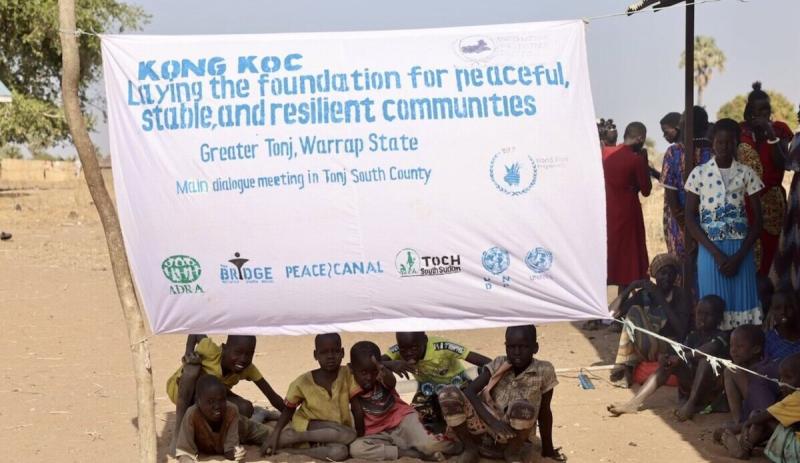

South Sudan RSRTF - It was all about creating solid ground for peaceful relations when communities from the greater Tonj area got together for a dialogue. Photos: Zejin Yin/UNMISS
WARRAP - In the local language, kong koc means “to wait,” just like what communities in Greater Tonj are doing. More specifically, they are waiting for peace and development after years of frustration caused by intercommunal violence and lack of resources.
Funded by the South Sudan Multi-Partner Trust Fund for Reconciliation, Stabilization, and Resilience (RSRTF), the Kong Koc Project has started its second phase of activities, consisting of a number of dialogues to restore their faith and hope in peaceful coexistence.
With that objective, a three-day consultation for the greater Thiet communities, located in Tonj South, was held to prioritize among issues and recommendations from pre-dialogues, understand and review the communities’ concepts of accountability and decide on a way forward.
“I’m happy that our partners approach us with initiative and enthusiasm. However, we must strengthen our institutions and empower young people and women. Conflicts have ended in our communities, but we still lack food and infrastructure,” said William Deng Majok, Administrator in Thiet Payam [small administrative division]. “We hope that the government and peace partners can help us develop agriculture and boost local business.”
Besides lacking resources, a shaky rule of law was unanimously cited as the primary cause of conflict in the area.
“It’s time to reevaluate the laws we’ve always used to settle disputes. They are antiquated, they often ignore the rights of women, not least when it comes to criminal cases. For instance, we don’t want convicted rapists do be released from jail after paying cows [as compensation to the survivor] but to be held fully accountable,” said Aluel Akuol, a women’s representative from Jak Payam.
Insufficient justice infrastructure remains another challenge for citizens wanting to report crimes.
“We lack both police stations and prisons. People are forced to travel long distances to report incidents, often on foot, which sometimes makes people desist,” said Marco Manyang, a cattle camp leader in Wanh-alel, who also calls for more training of law enforcers. “The police are often unable to handle investigations and the perpetrators of crimes properly because they don’t know how to do it. Soon after handing over cash or cattle, the criminals are at large again,” he added.
According to Sabine Arnold, a legal adviser working with the United Nations Mission in South Sudan (UNMISS), progress has been made.
“I’m happy you all have a firm grasp on how crimes should be reported, because that was not the case before. Please continue to identify challenges you are encountering when you try to adhere to the proper procedures, because we may be able to include and address these issues by means of the Kong Koc project,” she told participants.
Rose Anyang, Warrap State’s Minister of Gender and Social Welfare, urged neighbouring communities to maintain their currently peaceful relations. She also appealed to partners to invest more in the needs of women and young people.
“We need activities that can empower these groups, including support centres for survivors of gender-based violence and workshops on leadership and conflict prevention,” the Minister said.
The dialogue was supported by multiple partners, including UNMISS, the United Nations Development Programme, World Food Programme, the Adventist Development and Relief Agency, Peace Canal, and the Organisation for Child Harmony.
Originally published on https://unmiss.unmissions.org